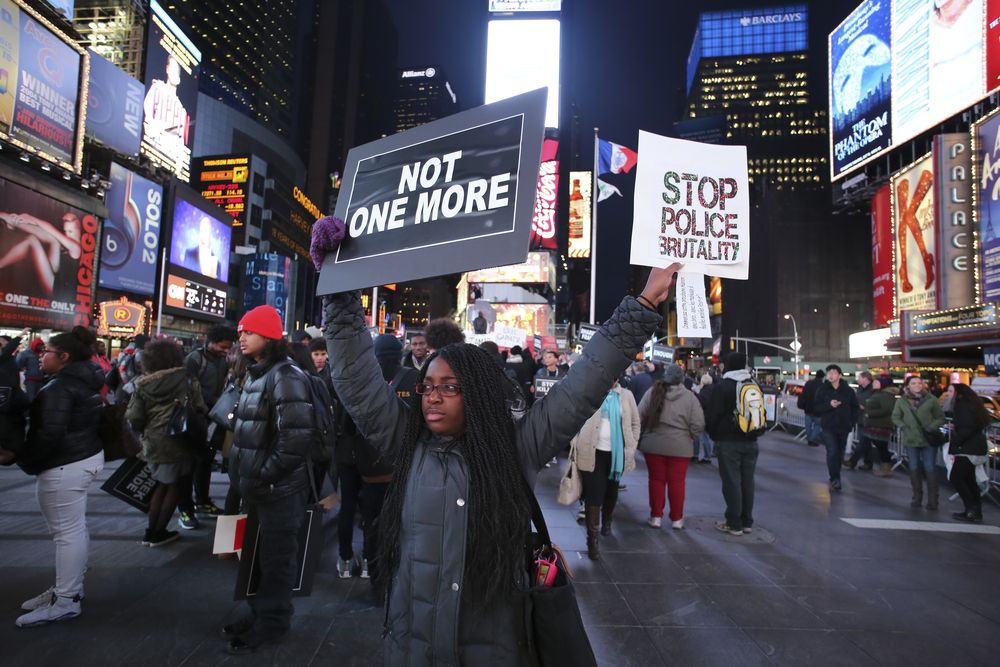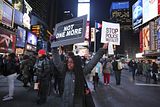Black Communities Must Strive for Solidarity not Respectability

by Jenn M. Jackson
I recently read a post from a friend on social media which read “Michael Brown isn’t a horse I want to hitch my wagon to.” Phrases like this are predictable given the increased racial tension following Darren Wilson’s non-indictment in early December. However, when they come from Blacks themselves, they underscore an insidious commitment to respectability politics which leaves no room for the humanity of Black victims of police brutality. Further, they signal the need for dialogue on systemic oppression not just with White Americans but within Black communities.
Many Whites maintain that the election of President Obama signaled a collective movement beyond the issues of race and racism in this country. According to them, America being post-racial means any remaining disparities are attributable to individual and community failures rather than institutional racism. However, the lived experiences of Blacks in the US proves otherwise.
Black male teens are twenty-one times more likely to be killed by police than White male teens. Black women, too, are frequently killed by law enforcement, but we just rarely hear about it. The false pretense of the saintly redeeming power of the Black First Family hasn’t signaled forward movement for Black Americans. Instead, it has acted as a cloaking device for racial hatred while perpetuating the mounting tensions between Black citizens and the authorities meant to “serve and protect” them.
Frankly, I have heard comments like, “Stop killing each other,” “Pull up your pants,” and, “Take care of your kids,” in Black social groups just as much as I have heard it from White pundits and TV personalities. Concerns about whether or not murdered Black victims were on the Honor Roll, if they ever used drugs, or if they were well-spoken or not implies that, if they didn’t meet certain respectability standards, they deserved the violence committed against them. Yet, these standards are nonexistent for any other group. Only in the case of Black Americans is humanity expected to be earned and bought with the currency of respectability politics.
Flawed logic of this sort implies that if Black victims of police violence had just been better-behaved, they might still be alive. We know this isn’t even remotely factual. Rekia Boyd was an unarmed bystander when she was killed by a Chicago police officer. Seven year old Aiyana Stanley-Jones was killed while sleeping next to her grandmother on a couch by a member of the Detroit SWAT Team. They weren’t committing any crimes. They weren’t engaging in unlawful activities. They were killed for existing while Black and female.
Respectability isn’t Kevlar. It can’t protect us from barrages of police bullets. When being Black in public means we always fit the description, our pants, dialect, degrees, or credentials don’t protect us.
That so many Black people have resorted to respectability politics rather than solidarity – despite evidence of the ongoing disparities in violence against us – underscores the failing mythological nature of post-racialism. Police officers aren’t checking backgrounds before killing Black children, men, and women. They aren’t asking for references or verifying that these individuals are upstanding citizens. They are shooting first and asking questions last. It’s time we come to terms with this reality.
We don’t live in a utopian society where all are racial groups are afforded equal opportunities, liberty, justice, and full humanity. Black lives are devalued by police and civilians more than any other group. It is for these reasons the #BlackLivesMatter rallying cry exists. This movement isn’t just for convincing White Americans of our worth. It is a part of a larger struggle to destigmatize Black bodies, delegitimize capital punishment against us, and make a declarative statement about the innate value of Black people. As such, calls for post-racialism by Black Americans does more harm than good.
Within Black communities, there have always been divides. Those who agreed with Booker T. Washington’s calls to “cast down your bucket” disagreed with Marcus Garvey’s pan-Africanism. Northern and southern Blacks were split in their support of the revolutionary orator Malcolm X versus the diplomatic Martin Luther King, Jr. And, when Ella Baker led college students in the Student Nonviolent Coordinating Committee (SNCC), she was met with resistance from older activists who believed confrontations with southern Whites would reignite racial tensions. The protests throughout 2014 faced the same opposition. There is little agreement on how we get beyond racism, systemic oppression, and economic disparity. But, that doesn’t mean we should give up altogether.
Dealing with Black Americans who believe we are post-racial is exasperating but it isn’t new. I can guarantee it won’t end with us. We won’t always agree on how to get “there.” We may not even agree where “there” is at all. But we must find ways to band together as we progress.
We have come too far and have even further to go to turn back now. And, turning away from one another weakens all of us… no matter how respectable we think we are.
Photo credit: a katz / Shutterstock.com
Jenn M. Jackson is a "Jill" of all trades who writes, educates, and activates all in the name of making the world a better place. She co-runs the popular 'blerd' (black nerd) blog Water Cooler Convos with her husband while they raise three gorgeous children in the suburbs of Chicago. Find her on Twitter: @JennMJack and read more from her at jennmjackson.com.
I recently read a post from a friend on social media which read “Michael Brown isn’t a horse I want to hitch my wagon to.” Phrases like this are predictable given the increased racial tension following Darren Wilson’s non-indictment in early December. However, when they come from Blacks themselves, they underscore an insidious commitment to respectability politics which leaves no room for the humanity of Black victims of police brutality. Further, they signal the need for dialogue on systemic oppression not just with White Americans but within Black communities.
Many Whites maintain that the election of President Obama signaled a collective movement beyond the issues of race and racism in this country. According to them, America being post-racial means any remaining disparities are attributable to individual and community failures rather than institutional racism. However, the lived experiences of Blacks in the US proves otherwise.
Black male teens are twenty-one times more likely to be killed by police than White male teens. Black women, too, are frequently killed by law enforcement, but we just rarely hear about it. The false pretense of the saintly redeeming power of the Black First Family hasn’t signaled forward movement for Black Americans. Instead, it has acted as a cloaking device for racial hatred while perpetuating the mounting tensions between Black citizens and the authorities meant to “serve and protect” them.
Frankly, I have heard comments like, “Stop killing each other,” “Pull up your pants,” and, “Take care of your kids,” in Black social groups just as much as I have heard it from White pundits and TV personalities. Concerns about whether or not murdered Black victims were on the Honor Roll, if they ever used drugs, or if they were well-spoken or not implies that, if they didn’t meet certain respectability standards, they deserved the violence committed against them. Yet, these standards are nonexistent for any other group. Only in the case of Black Americans is humanity expected to be earned and bought with the currency of respectability politics.
Flawed logic of this sort implies that if Black victims of police violence had just been better-behaved, they might still be alive. We know this isn’t even remotely factual. Rekia Boyd was an unarmed bystander when she was killed by a Chicago police officer. Seven year old Aiyana Stanley-Jones was killed while sleeping next to her grandmother on a couch by a member of the Detroit SWAT Team. They weren’t committing any crimes. They weren’t engaging in unlawful activities. They were killed for existing while Black and female.
Respectability isn’t Kevlar. It can’t protect us from barrages of police bullets. When being Black in public means we always fit the description, our pants, dialect, degrees, or credentials don’t protect us.
That so many Black people have resorted to respectability politics rather than solidarity – despite evidence of the ongoing disparities in violence against us – underscores the failing mythological nature of post-racialism. Police officers aren’t checking backgrounds before killing Black children, men, and women. They aren’t asking for references or verifying that these individuals are upstanding citizens. They are shooting first and asking questions last. It’s time we come to terms with this reality.
We don’t live in a utopian society where all are racial groups are afforded equal opportunities, liberty, justice, and full humanity. Black lives are devalued by police and civilians more than any other group. It is for these reasons the #BlackLivesMatter rallying cry exists. This movement isn’t just for convincing White Americans of our worth. It is a part of a larger struggle to destigmatize Black bodies, delegitimize capital punishment against us, and make a declarative statement about the innate value of Black people. As such, calls for post-racialism by Black Americans does more harm than good.
Within Black communities, there have always been divides. Those who agreed with Booker T. Washington’s calls to “cast down your bucket” disagreed with Marcus Garvey’s pan-Africanism. Northern and southern Blacks were split in their support of the revolutionary orator Malcolm X versus the diplomatic Martin Luther King, Jr. And, when Ella Baker led college students in the Student Nonviolent Coordinating Committee (SNCC), she was met with resistance from older activists who believed confrontations with southern Whites would reignite racial tensions. The protests throughout 2014 faced the same opposition. There is little agreement on how we get beyond racism, systemic oppression, and economic disparity. But, that doesn’t mean we should give up altogether.
Dealing with Black Americans who believe we are post-racial is exasperating but it isn’t new. I can guarantee it won’t end with us. We won’t always agree on how to get “there.” We may not even agree where “there” is at all. But we must find ways to band together as we progress.
We have come too far and have even further to go to turn back now. And, turning away from one another weakens all of us… no matter how respectable we think we are.
Photo credit: a katz / Shutterstock.com
Jenn M. Jackson is a "Jill" of all trades who writes, educates, and activates all in the name of making the world a better place. She co-runs the popular 'blerd' (black nerd) blog Water Cooler Convos with her husband while they raise three gorgeous children in the suburbs of Chicago. Find her on Twitter: @JennMJack and read more from her at jennmjackson.com.

No comments: